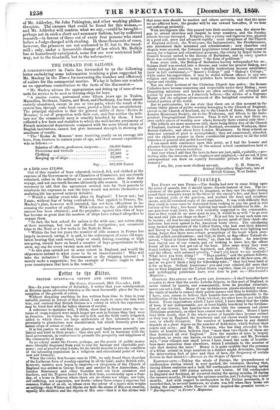Itttn to tht
BRITISH GIIIANA—A. COTTON AND COFFEE FEEL%
The Grove, Gravesend, 281h .21rovember, 1&59.
San—In your impression of Saturday, I notice that your correspondent at Brixton again advocates Jamaica as the most favourable place for the re- sumption of the growth of cotton.
Without disputing anything he has written from time to time in your valuable journal in favour of that island, I am ready to enter the lists with him, and contend that British Guiana is a colony in which the experiment may be tried first with far better chances of success.
A reference to statistics will, I think, show that in former years the re- turns of crops realized were much larger per acre in Guiana than they were in Jamaica. In Guiana, too, the soil is nch and the fields easily irrigated, added to which there are large settlements of free labourers in close proximity to plantations now uncultivated, but which formerly grew im- mense crops of cotton or coffee.
It is but justice to add that the planters and landowners generally are liberal and kind to their people ; they also pull well in harmony with the local government, in endeavours to promote the prosperity and happiness of the community at large. In no colony under the Crown, perhaps, are the grants of public money more liberally dispensed from year to year for humane and charitable pur- poses; and as proof of what I state, let me briefly describe to you the condition of the labouring population in a religious and educational point of view, now and formerly.
When the colony first became ours in 1796, we only found three churches of the Lutheran form of worship existing in all the land ; under British rule, however, matters soon began to unprove,---11 clergyman of the Church of England was settled in George Town and another in New Amsterdam, the London Missionary and other Societies sent out their ministers and teachers, and the Negroes heard for the first time, occasionally upon a Sun- day, of a home in Heaven where there are no chains nor whips, nor toils, nor suffering, nor separation, nor death—where there reigns a supreme but common Father of us all, in whose eyes the colour of a man's skin weighs as nothing—that Whites and Blacks are both the atoms of His own creation, equally His children and the objects of His care—that it is His divine will
that some men should be masters and others servants, and that the more we are afflicted here, the greater will be our reward hereafter, if we bear our sufferings patiently.
With intelligence like this poured into their anxious ears, the slaves be- gan to attend churches and chapels in large numbers, and the Sunday schools became thronged. Religion, like a young and vigorous tree, planted in a good soil, grew and advanced rapidly : more clergymen of the Uhurch of England arrived ; the Wesleyans, the Independents, the Presbyterians, also introduced their ministers and schoolmasters ; new churches and chapels were erected, the Colonial Legislature voted annually large sums of money for religious and educational purposes the colony by Royal Order in Council became united to the diocese of Bahiadoes, and in every quarter there was certainly made to appear "the form of godliness."
Some years later, the Bishop of Barbadoes having relinquished his Se., Guiana itself was erected into a diocese and under the present Bishop, ann chiefly. through his exertion, two valuable institutions became established (now in full usefulness),—" Queen's College" and "Bishop's College ; " while under his supervision, it may be stated without offence to any one, religion and education in many parishes have become infused with more vigour and vitality.
Nor are other sections of the Christian Church less active : the Roman Catholics have become numerous and respectable under their Bishop • more Dissenting ministers and teachers are often arriving, all actuated and guided by pure motives, as I sincerely beliove,—the service of a Supreme Master and the religious advancement of His benighted creatures in this isolated portion of the world. But to particularize, let me state that there are at this moment in the colony thirty places of public worship belonging to the Church of England, eleven to the Church of Scotland, six to the Church of Rome, fifteen to the London Missionary Society, six to the Wealeyans, and fifteen to the Inde- pendent Congregational Dissenters. Thus it will be seen that there are over eighty places of worship now where formerly there existed only three ! The schools are more numerous still, there being thirty-five of the Church of England, fourteen of the Church of Scotland, seventeen Wesleyan, three Roman Catholic, and about forty London Missionary. In these schools an immense amount of good is accomplished ; they are numerously attended, and the children acquire in them considerable proficiency in all the solid branches of general and useful knowledge. I Can speak with confidence upon this point, as I had the honour and pleasure frequently of presiding at the annual school examinations held at Christmas in the various localities.
And now when I add that the laws in force are just, mild, eauitable'i—pro- tecting alike the interests of the employer and employed,—let me ask f your correspondent can draw an equally favourable picture of the island of Jamaica ?
I am, Sir, your most obedient servant, C. H. Srunrr, Retired Stipendiary Magistrate, late of British Guiana, West Indies.


























 Previous page
Previous page